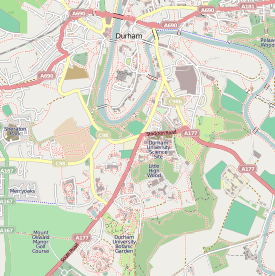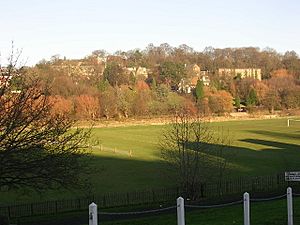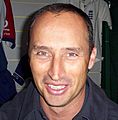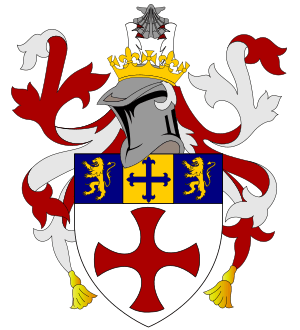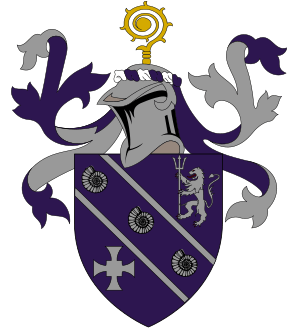College of St Hild and St Bede, Durham facts for kids
Quick facts for kids College of St Hild and St Bede |
||||||||||||||||||||||||||
|---|---|---|---|---|---|---|---|---|---|---|---|---|---|---|---|---|---|---|---|---|---|---|---|---|---|---|
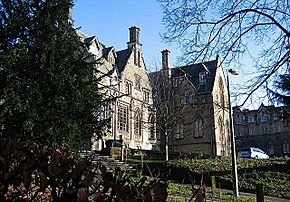
St Hild and St Bede College
|
||||||||||||||||||||||||||
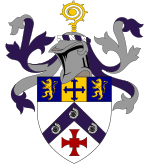
Arms of St Hild & St Bede
Blazon: Argent on a Chevron Purpure three Ammonites of the first in base a Cross paty quadrate Gules a Chief Azure thereon between two Lions rampant Or a pale of the last charged with a Cross patonce also Azure |
||||||||||||||||||||||||||
|
|
||||||||||||||||||||||||||
| University | University of Durham | |||||||||||||||||||||||||
| Coordinates | 54°46′39″N 1°33′53″W / 54.7775°N 1.564815°W | |||||||||||||||||||||||||
| Latin name | Collegium Sanctae Hildae et Beda Venerabilis | |||||||||||||||||||||||||
| Motto | Latin: Eadem mutata resurgo | |||||||||||||||||||||||||
| Motto in English | I rise again, changed but the same | |||||||||||||||||||||||||
| Established | 1975 (precursors in 1839 and 1858) | |||||||||||||||||||||||||
| Named for | The Venerable Bede & St Hild | |||||||||||||||||||||||||
| Principal | Simon Forrest | |||||||||||||||||||||||||
| Undergraduates | 1123 | |||||||||||||||||||||||||
| Postgraduates | 111 | |||||||||||||||||||||||||
| Senior tutor | Laura Todd | |||||||||||||||||||||||||
| Website |
|
|||||||||||||||||||||||||
| Map | ||||||||||||||||||||||||||
The College of St Hild and St Bede, often called Hild Bede, is a college that is part of Durham University in England. It's the second largest college at the university, with over 1,000 students. This college, which welcomes both boys and girls, was created in 1975. It was formed when two much older colleges, the College of the Venerable Bede (for men) and St Hild's College (for women), joined together.
Hild Bede is located right by the River Wear in Durham. This makes it the only college known as a 'river' college. It sits between Durham's main 'peninsula' area and Gilesgate.
Contents
A Look Back: The History of Hild Bede
How it All Started
The College of the Venerable Bede, for men, began in 1838. It started with a small group of students training to become school teachers. Over the next few decades, the college grew a lot. A local politician named William Crawford helped a lot with this growth.
St Hild's College, for women, opened nearby in 1858. It also focused on training women to be teachers.
Joining the University
Both colleges first focused on teacher training. But in the 1890s, they became connected with the larger University of Durham. They started offering university degrees like BA and BSc, alongside their teaching courses. In 1898, students from St Hild's were the first women to graduate from Durham University!
The Chapel of the Venerable Bede was finished in 1939. It was built to celebrate Bede College's 100th birthday.
Becoming One College
The two colleges stayed connected over the years. They shared some classes and facilities. In the 1960s, they even built a shared building called the Caedmon Complex.
Eventually, in 1975, the colleges officially merged. They became the College of St Hild and St Bede. In 1979, Hild Bede became a full college of the university. This meant it was fully part of Durham University.
New Beginnings: Renovations and a Temporary Home
Over time, some of the college buildings needed major updates. Because of various issues, only a few accommodation blocks were still in use by 2023/24.
In 2024, the college announced a big change. It would temporarily move its main operations to Rushford Court. This move allows the original site to undergo major renovations until 2026/27. Some older buildings, like Caedmon Hall and Thorp, are even planned to be taken down. A new 19th college is planned to be built where these buildings once stood.
College Buildings: Past and Present
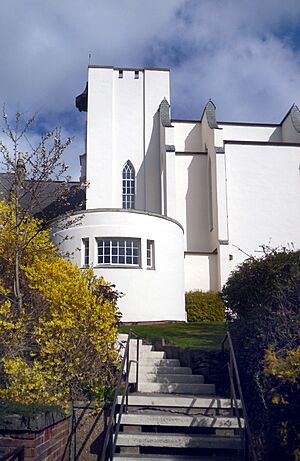
The Original College (1858-2024)
Before the big renovations, the college had many different buildings. The main Hild building was the central spot. It held offices, computer rooms, common rooms, and many student bedrooms.
Other large student living areas included Thorp, Christopher, and Bede. There were also smaller houses like Charles Stranks and Ernest Place.
At the heart of the college was the Caedmon Complex. This building had the main dining hall and the college bar, called The Vernon Arms. It also housed music rooms and Bede Film Society, which is the only student-run cinema in Durham.
Hild Bede is one of only two colleges in Durham with two chapels. The Chapel of St. Hild is now a function room called the Joachim Room. The Chapel of the Venerable Bede is still used for services. The college also has a boathouse by the river for its boat club.
Rushford Court: The Temporary Home
Since the 2024/25 school year, the college has moved to Rushford Court. This temporary campus has both older and newer student accommodation.
Rushford Court also has its own gym, a cinema room, and a games area. There's a new 'Heart' building too, which has more student spaces, including the bar.
College Traditions and Fun Events
Symbols and Colours
To remember the two original colleges, Hild Bede uses special colours. Boys often wear light and dark blue, which were the Bede College colours. Girls wear green and lilac, the colours of the original Hild College.
The college's official crest also shows its history. It combines parts from the old Bede College crest and St Hild's College crest.
Gowns and Formals
Students at Hild Bede wear special gowns that are different from other Durham gowns. They are made of a unique fabric and are shorter. These gowns are worn for graduation.
Instead of wearing gowns for formal dinners, these events are usually 'black tie'. These formal dinners happen about ten times a year. They include traditional dinners and fun themed formals, like for Halloween or St Patrick's Day.
College Anthem
The official song for the college is 'Never Forget' by Take That. You'll often hear college staff perform it at karaoke or play it during formal events!
Special College Events
Like many Durham colleges, Hild Bede has an annual college day, usually in early May. This day is full of fun activities. It often includes a fancy breakfast, a buffet lunch, picnics, and entertainment. You might see bands, fairground games, a disco, and even college Olympics!
In late April, the college holds a special ceremony called the sounding retreat. This event remembers former college members who have died in conflicts around the world.
The college also hosts two big annual parties: the Winter Ball and the Summer Ball. The Summer Ball used to be one of the biggest parties in Durham. It often featured famous music acts like Pixie Lott or Vengaboys. Now, the balls often feature 'tribute acts' of popular artists.
Student Representative Council (SRC)
At Hild Bede, all students, both undergraduate and postgraduate, are represented by one group called the Student Representative Council (SRC). This is different from most other colleges.
The SRC has an elected committee of student volunteers. This committee is led by a full-time, paid President. Other roles include a Social Secretary, Vice President, and officers for sports, welfare, and more.
Student Life at Hild Bede
Sports
Hild Bede has many popular sports clubs. Hild Bede AFC is the college football club, with seven teams playing every weekend.
The college also has rugby teams: Bede RFC for men and Hild RFC for women. They play in the traditional college colours.
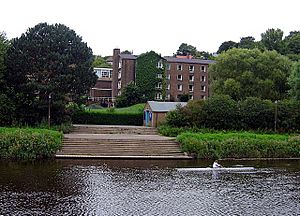
The boat club has been very successful. They have qualified for the famous Henley Royal Regatta several times. The college also has clubs for squash, running, badminton, and basketball.
Mascot
The official animal for Hild Bede college is the bear. The mascot of the SRC is named "Bedo," which comes from "Bede" in the college's name.
Theatre
Hild Bede Theatre is the largest college drama group in Durham. They put on at least three plays each year, including a musical at the start of the summer term. They have won many awards for their plays and musicals.
Cinema
Hild Bede is home to Bede Film Society, the only student cinema in Durham. It's also Durham's oldest and cheapest cinema! The society shows recent films on a new digital projector with great sound. Films are usually shown on weekends. The society started over fifty years ago, even before the two colleges merged.
Bar Quiz
Every Thursday, the college bar, "the Vern," hosts its famous bar quiz. It usually has 50 questions on different topics. The winning team gets a £20 bar tab! The last round of the quiz is always a "Wipeout" round. If you answer a question wrong in this round, you lose all your points for that round.
Awards
Each year, some students receive the Ann Boynton Award. This award is for students who show great college spirit and also do very well in their studies. Their names are carved onto a special board in the Vern.
Another award is the Honorary Lifetime Membership award. The SRC President gives this to people who have helped college life a lot. There's also the Senior Common Room Award for first-year students who have contributed significantly to the college.
Who Were the Principals?
College of the Venerable Bede
- John Cundill 1841-1852
- J. G. Cromwell 1852–1861
- Arthur Rawson Ashwell 1861–1881
- S. Barradell Smith 1881–1886
- T. Randell 1886–1892
- S. Barradell Smith 1892–1896
- G. H. S. Walpole 1896–1905
- D. Jones 1905–1925
- E. F. Braley 1925–1947
- G. E. Brigstocke 1948–1959
- K. G. Collier 1959–1975
St. Hild's College
- C. W. King 1862–1864
- Canon W. H. Walter 1864–1889
- Canon J. Haworth 1889–1910
- E. Chrisopher 1910–1933
- A. Lawrence 1933–1951
- N. Joachim 1951–1975
College of St Hild and St Bede
- J. Vernon Armitage 1975 to 1997
- D. J. Davies 1997–2000
- J. Alan Pearson 2000–2008
- C. J. Hutchison 2008–2012
- L. Worden 2012–2013
- C. J. Hutchison 2013–2014
- A. Darnell 2014–2015
- J. Clarke 2015–2019
- S. Forrest 2019-Present
Famous People Who Attended Hild Bede
Many interesting people have studied at Hild Bede or its older colleges.
-
George Lazenby, an Australian actor who played James Bond.
From Bede College
- Paul Allott, a cricketer for Lancashire and England.
- Sir Robert Burgess, who became the Vice-Chancellor of Leicester University.
- Jack Cunningham, a British politician who was a Member of Parliament.
- Graeme Fowler, a cricketer for Lancashire, Durham, and England.
- George Lazenby, famous for playing James Bond in a 1969 film.
- Fred Peart, Baron Peart, a politician who served in Labour governments.
- Jock Wishart, known for setting a world record for sailing around the globe.
From St Hild's College
- Revd Kate Tristram, one of the first women to become a priest in the Church of England.
- Mary Stewart, a famous novelist.
From Hild Bede College
- Caroline Atkins, an England cricketer.
- Nick Gibb, a politician who is a Member of Parliament for Bognor Regis and Littlehampton.
- Chris Hollins, a TV presenter who won Strictly Come Dancing in 2009.
- Nasser Hussain, a former captain of the English cricket team.
- Gabby Logan, a TV presenter and former gymnast.
- Stuart MacRae, a composer.
- Mark Rylands, who became the Bishop of Shrewsbury.
- Rupert Whitaker, who helped start the Terence Higgins Trust, a charity.
- Will Fletcher, a GB Lightweight rower and coach.
- Callum McBrierty, a GB Rower.
 | Selma Burke |
 | Pauline Powell Burns |
 | Frederick J. Brown |
 | Robert Blackburn |


